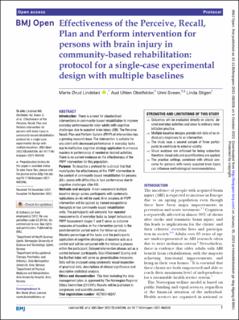Effectiveness of the Perceive, Recall, Plan and Perform intervention for persons with brain injury in community-based rehabilitation: protocol for a single-case experimental design with multiple baselines
Peer reviewed, Journal article
Published version
Permanent lenke
https://hdl.handle.net/11250/3046858Utgivelsesdato
2022Metadata
Vis full innførselSamlinger
Sammendrag
Introduction There is a need for standardised interventions in community-based rehabilitation to improve everyday performance for older adults with cognitive challenges due to acquired brain injury (ABI). The Perceive, Recall, Plan and Perform System (PRPP) of intervention has a growing research base. The intervention is suitable for any client with decreased performance in everyday tasks due to ineffective cognitive strategy application to enhance mastery in performance of needed or desired activities. There is no current evidence on the effectiveness of the PRPP intervention for this population.
Purpose To describe a protocol for a clinical trial that investigates the effectiveness of the PRPP intervention in the context of community-based rehabilitation for persons (65+ years) with difficulties in task performance due to cognitive challenges after ABI.
Methods and analysis A non-concurrent multiple baseline design across participants with systematic replications (n=6) will be used. Nine sessions of PRPP intervention will be applied by trained occupational therapists in two community-based rehabilitation units. The participants will complete five repeated measurements of everyday tasks as target behaviours. PRPP Assessment stages 1 and 2 serve as outcome measures at baseline, in the intervention period, in the postintervention period and in the follow-up phase. Mastery percentage of the tasks and the participants’ application of cognitive strategies at baseline acts as a control and will be compared with the following phases within the participant. Delayed intervention phases act as a control between participants. Goal Attainment Scaling and the Barthel Index will serve as generalisation measures. Data will be analysed using systematic visual inspection of graphical data, descriptions of clinical significance and descriptive statistical analysis.
Ethics and dissemination This trial, including the data management plan, is approved by The Norwegian Regional Ethics Committee (215391). Results will be published in congresses and scientific journals.

